Personal and Professional Development Plan for John Lewis Partnership
VerifiedAdded on 2020/01/15
|20
|5574
|150
Report
AI Summary
This report provides a detailed analysis of personal and professional development, focusing on self-managed learning within the context of the John Lewis Partnership. It begins by evaluating different approaches to self-managed learning, including Kolb's and Honey and Mumford's learning styles, and discusses how lifelong learning can be encouraged in both personal and professional settings. The report highlights the benefits of self-managed learning for individuals and organizations, addressing a work-based problem and proposing solutions. It further examines communication strategies at various organizational levels and evaluates time management techniques. The report concludes with a personal and professional development plan, considering development needs and opportunities to meet them. Overall, the report provides insights into enhancing skills, improving performance, and achieving personal and professional goals within an organizational context.
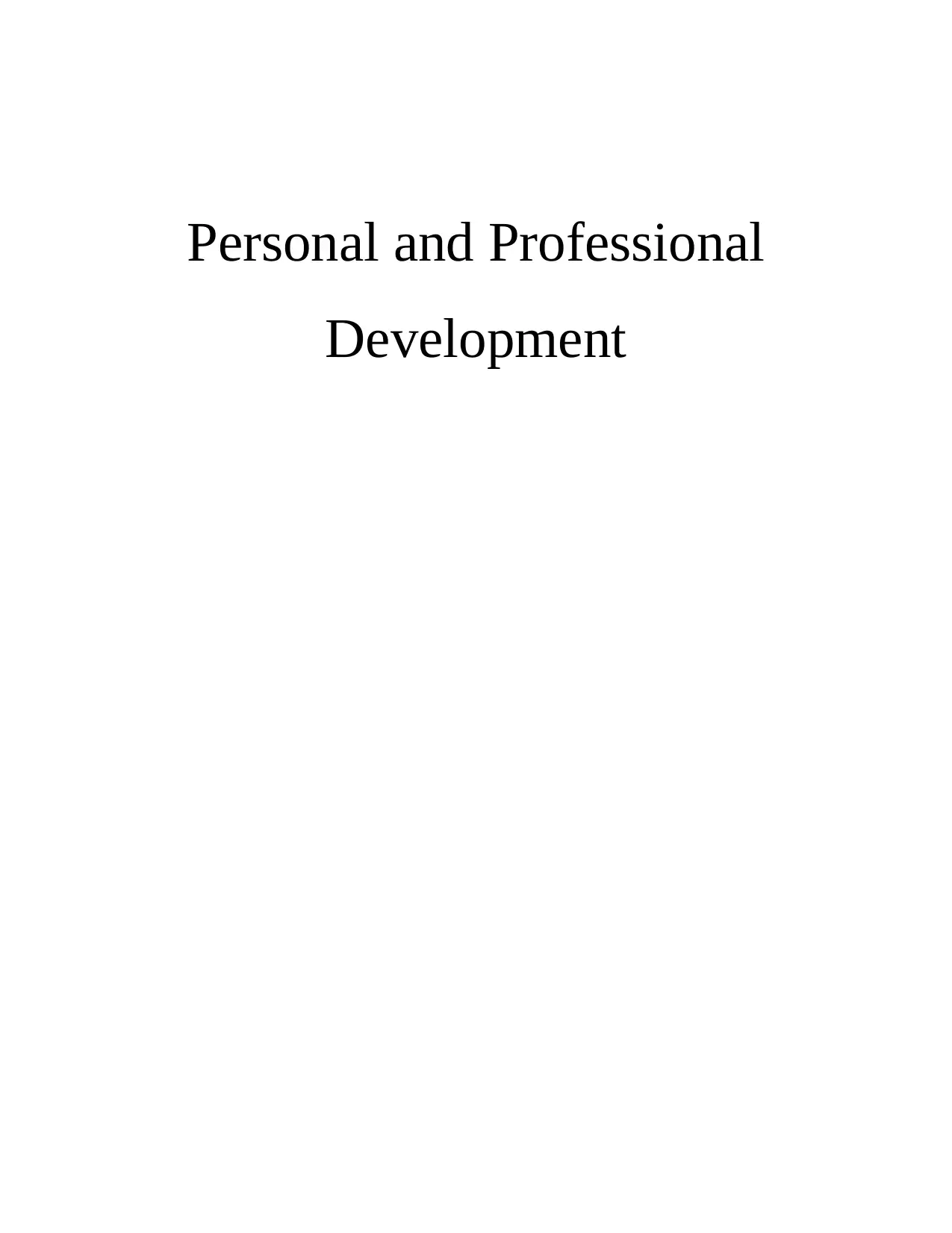
Personal and Professional
Development
Development
Paraphrase This Document
Need a fresh take? Get an instant paraphrase of this document with our AI Paraphraser
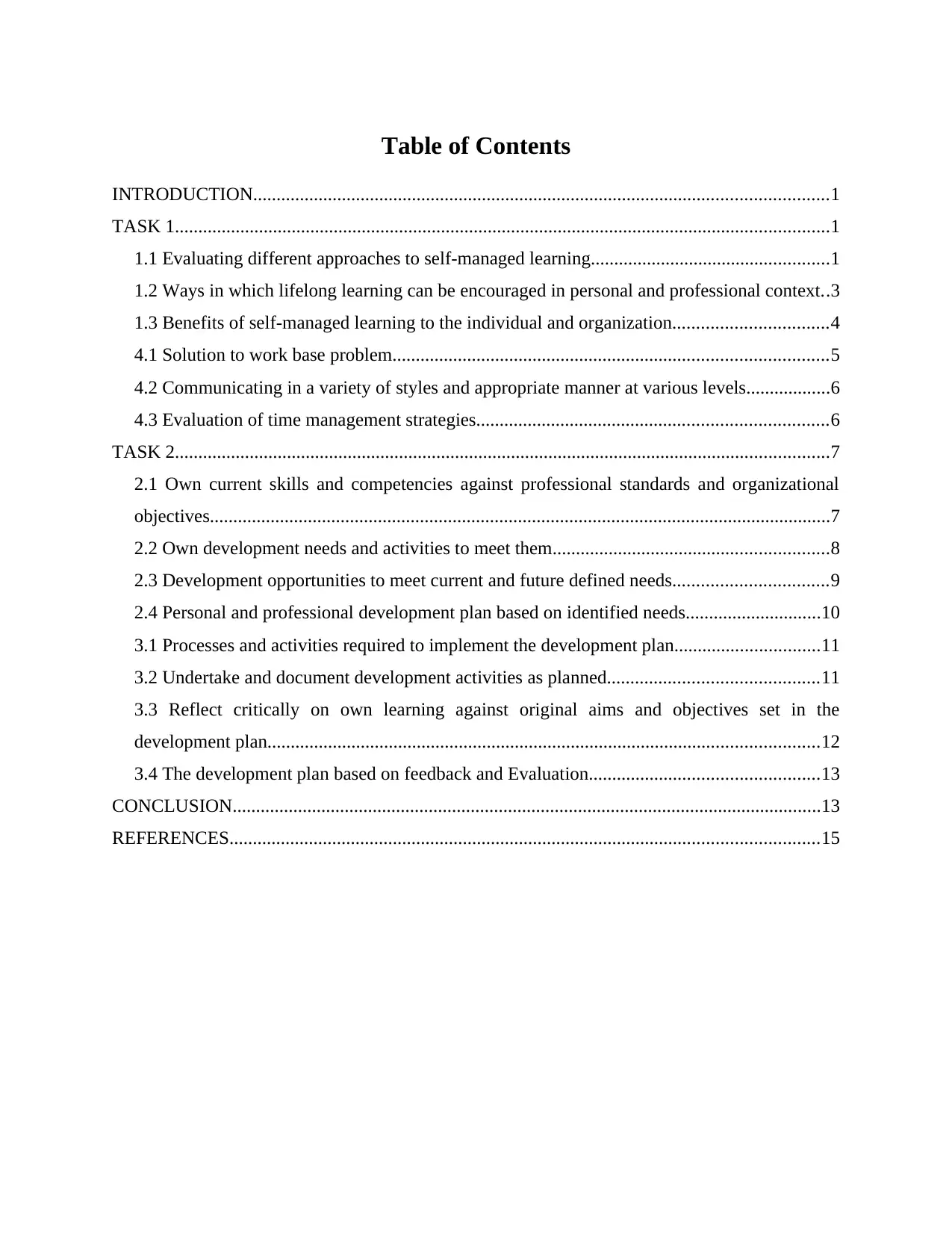
Table of Contents
INTRODUCTION...........................................................................................................................1
TASK 1............................................................................................................................................1
1.1 Evaluating different approaches to self-managed learning...................................................1
1.2 Ways in which lifelong learning can be encouraged in personal and professional context..3
1.3 Benefits of self-managed learning to the individual and organization.................................4
4.1 Solution to work base problem.............................................................................................5
4.2 Communicating in a variety of styles and appropriate manner at various levels..................6
4.3 Evaluation of time management strategies...........................................................................6
TASK 2............................................................................................................................................7
2.1 Own current skills and competencies against professional standards and organizational
objectives.....................................................................................................................................7
2.2 Own development needs and activities to meet them...........................................................8
2.3 Development opportunities to meet current and future defined needs.................................9
2.4 Personal and professional development plan based on identified needs.............................10
3.1 Processes and activities required to implement the development plan...............................11
3.2 Undertake and document development activities as planned.............................................11
3.3 Reflect critically on own learning against original aims and objectives set in the
development plan......................................................................................................................12
3.4 The development plan based on feedback and Evaluation.................................................13
CONCLUSION..............................................................................................................................13
REFERENCES..............................................................................................................................15
INTRODUCTION...........................................................................................................................1
TASK 1............................................................................................................................................1
1.1 Evaluating different approaches to self-managed learning...................................................1
1.2 Ways in which lifelong learning can be encouraged in personal and professional context..3
1.3 Benefits of self-managed learning to the individual and organization.................................4
4.1 Solution to work base problem.............................................................................................5
4.2 Communicating in a variety of styles and appropriate manner at various levels..................6
4.3 Evaluation of time management strategies...........................................................................6
TASK 2............................................................................................................................................7
2.1 Own current skills and competencies against professional standards and organizational
objectives.....................................................................................................................................7
2.2 Own development needs and activities to meet them...........................................................8
2.3 Development opportunities to meet current and future defined needs.................................9
2.4 Personal and professional development plan based on identified needs.............................10
3.1 Processes and activities required to implement the development plan...............................11
3.2 Undertake and document development activities as planned.............................................11
3.3 Reflect critically on own learning against original aims and objectives set in the
development plan......................................................................................................................12
3.4 The development plan based on feedback and Evaluation.................................................13
CONCLUSION..............................................................................................................................13
REFERENCES..............................................................................................................................15
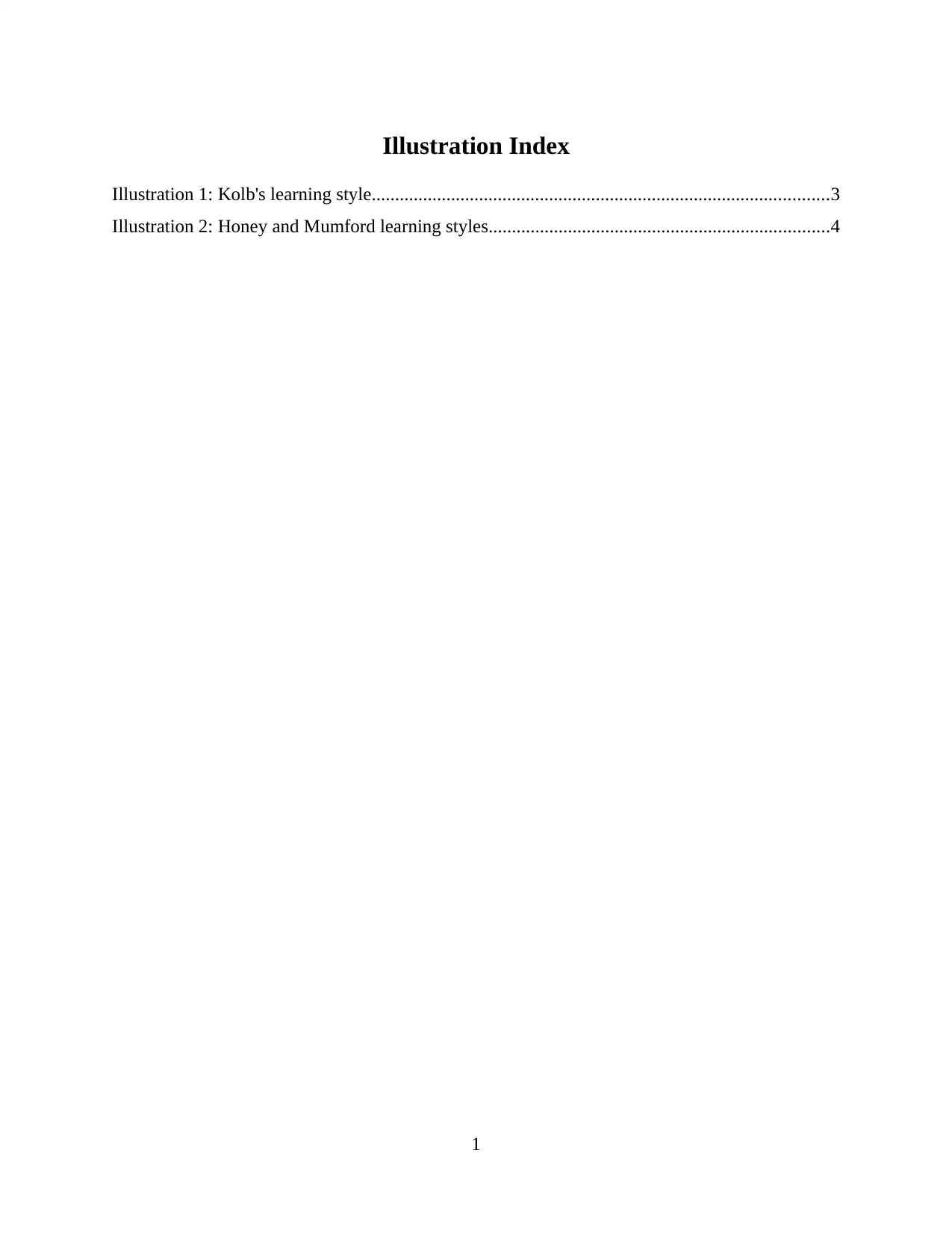
Illustration Index
Illustration 1: Kolb's learning style..................................................................................................3
Illustration 2: Honey and Mumford learning styles.........................................................................4
1
Illustration 1: Kolb's learning style..................................................................................................3
Illustration 2: Honey and Mumford learning styles.........................................................................4
1
⊘ This is a preview!⊘
Do you want full access?
Subscribe today to unlock all pages.

Trusted by 1+ million students worldwide
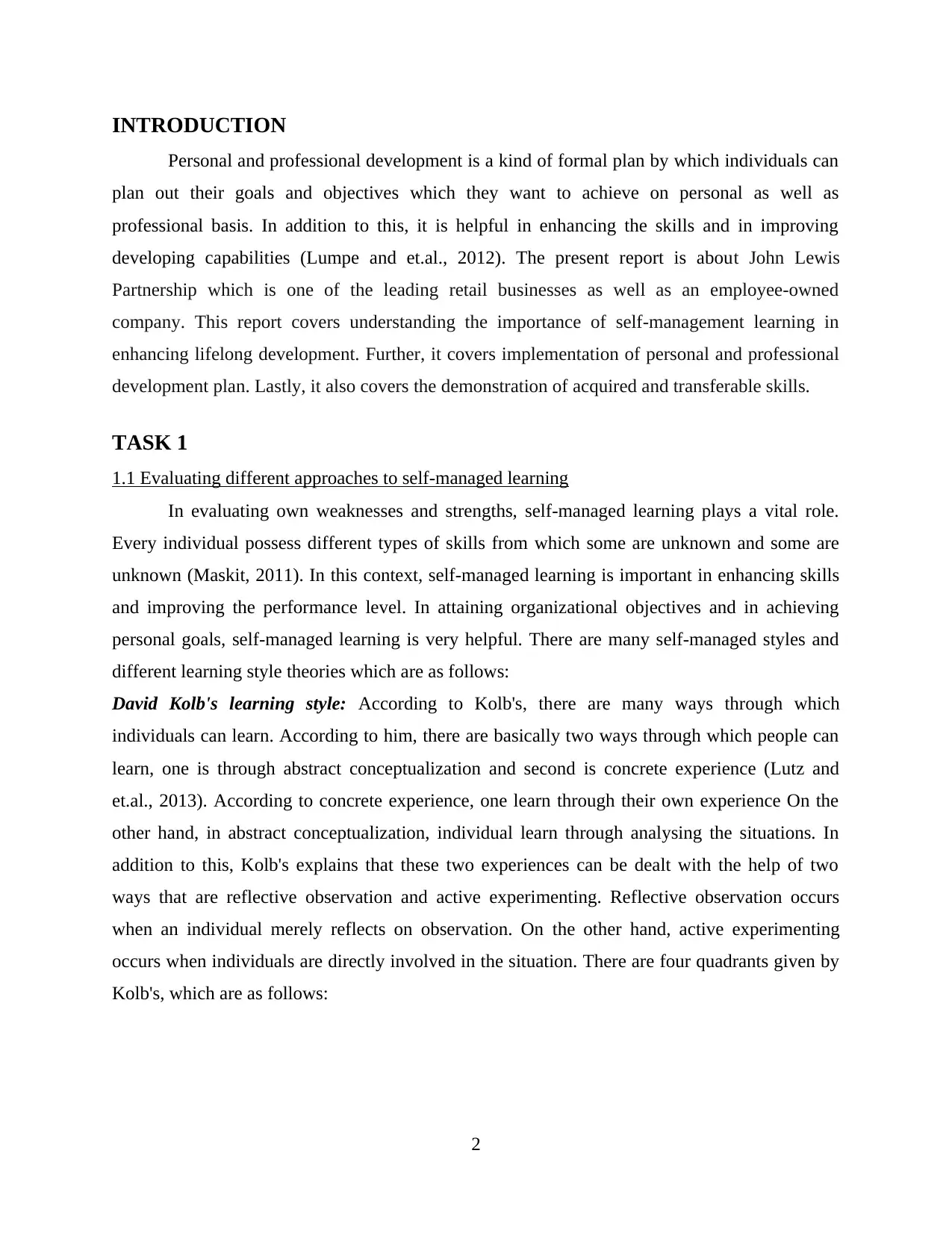
INTRODUCTION
Personal and professional development is a kind of formal plan by which individuals can
plan out their goals and objectives which they want to achieve on personal as well as
professional basis. In addition to this, it is helpful in enhancing the skills and in improving
developing capabilities (Lumpe and et.al., 2012). The present report is about John Lewis
Partnership which is one of the leading retail businesses as well as an employee-owned
company. This report covers understanding the importance of self-management learning in
enhancing lifelong development. Further, it covers implementation of personal and professional
development plan. Lastly, it also covers the demonstration of acquired and transferable skills.
TASK 1
1.1 Evaluating different approaches to self-managed learning
In evaluating own weaknesses and strengths, self-managed learning plays a vital role.
Every individual possess different types of skills from which some are unknown and some are
unknown (Maskit, 2011). In this context, self-managed learning is important in enhancing skills
and improving the performance level. In attaining organizational objectives and in achieving
personal goals, self-managed learning is very helpful. There are many self-managed styles and
different learning style theories which are as follows:
David Kolb's learning style: According to Kolb's, there are many ways through which
individuals can learn. According to him, there are basically two ways through which people can
learn, one is through abstract conceptualization and second is concrete experience (Lutz and
et.al., 2013). According to concrete experience, one learn through their own experience On the
other hand, in abstract conceptualization, individual learn through analysing the situations. In
addition to this, Kolb's explains that these two experiences can be dealt with the help of two
ways that are reflective observation and active experimenting. Reflective observation occurs
when an individual merely reflects on observation. On the other hand, active experimenting
occurs when individuals are directly involved in the situation. There are four quadrants given by
Kolb's, which are as follows:
2
Personal and professional development is a kind of formal plan by which individuals can
plan out their goals and objectives which they want to achieve on personal as well as
professional basis. In addition to this, it is helpful in enhancing the skills and in improving
developing capabilities (Lumpe and et.al., 2012). The present report is about John Lewis
Partnership which is one of the leading retail businesses as well as an employee-owned
company. This report covers understanding the importance of self-management learning in
enhancing lifelong development. Further, it covers implementation of personal and professional
development plan. Lastly, it also covers the demonstration of acquired and transferable skills.
TASK 1
1.1 Evaluating different approaches to self-managed learning
In evaluating own weaknesses and strengths, self-managed learning plays a vital role.
Every individual possess different types of skills from which some are unknown and some are
unknown (Maskit, 2011). In this context, self-managed learning is important in enhancing skills
and improving the performance level. In attaining organizational objectives and in achieving
personal goals, self-managed learning is very helpful. There are many self-managed styles and
different learning style theories which are as follows:
David Kolb's learning style: According to Kolb's, there are many ways through which
individuals can learn. According to him, there are basically two ways through which people can
learn, one is through abstract conceptualization and second is concrete experience (Lutz and
et.al., 2013). According to concrete experience, one learn through their own experience On the
other hand, in abstract conceptualization, individual learn through analysing the situations. In
addition to this, Kolb's explains that these two experiences can be dealt with the help of two
ways that are reflective observation and active experimenting. Reflective observation occurs
when an individual merely reflects on observation. On the other hand, active experimenting
occurs when individuals are directly involved in the situation. There are four quadrants given by
Kolb's, which are as follows:
2
Paraphrase This Document
Need a fresh take? Get an instant paraphrase of this document with our AI Paraphraser
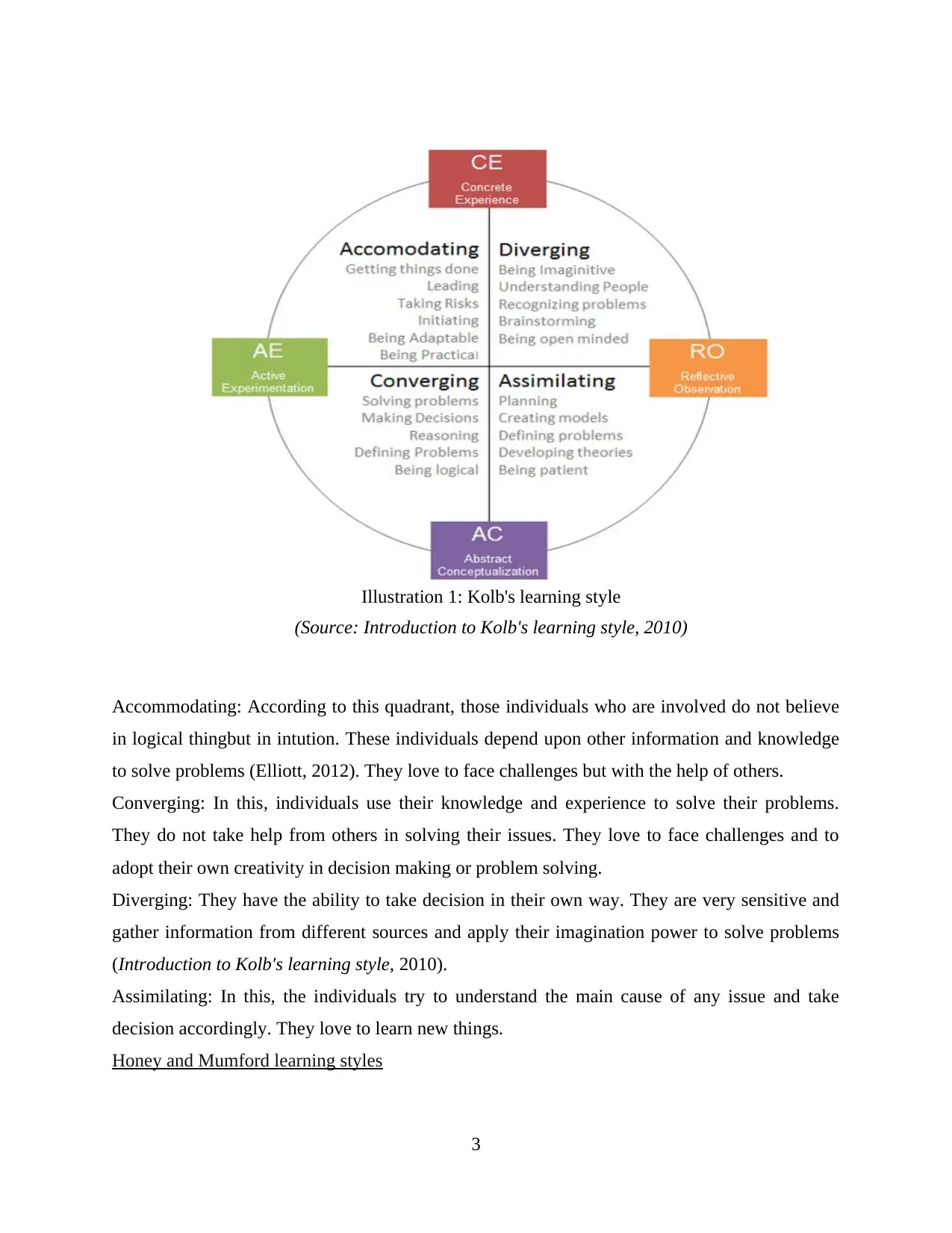
Accommodating: According to this quadrant, those individuals who are involved do not believe
in logical thingbut in intution. These individuals depend upon other information and knowledge
to solve problems (Elliott, 2012). They love to face challenges but with the help of others.
Converging: In this, individuals use their knowledge and experience to solve their problems.
They do not take help from others in solving their issues. They love to face challenges and to
adopt their own creativity in decision making or problem solving.
Diverging: They have the ability to take decision in their own way. They are very sensitive and
gather information from different sources and apply their imagination power to solve problems
(Introduction to Kolb's learning style, 2010).
Assimilating: In this, the individuals try to understand the main cause of any issue and take
decision accordingly. They love to learn new things.
Honey and Mumford learning styles
3
Illustration 1: Kolb's learning style
(Source: Introduction to Kolb's learning style, 2010)
in logical thingbut in intution. These individuals depend upon other information and knowledge
to solve problems (Elliott, 2012). They love to face challenges but with the help of others.
Converging: In this, individuals use their knowledge and experience to solve their problems.
They do not take help from others in solving their issues. They love to face challenges and to
adopt their own creativity in decision making or problem solving.
Diverging: They have the ability to take decision in their own way. They are very sensitive and
gather information from different sources and apply their imagination power to solve problems
(Introduction to Kolb's learning style, 2010).
Assimilating: In this, the individuals try to understand the main cause of any issue and take
decision accordingly. They love to learn new things.
Honey and Mumford learning styles
3
Illustration 1: Kolb's learning style
(Source: Introduction to Kolb's learning style, 2010)
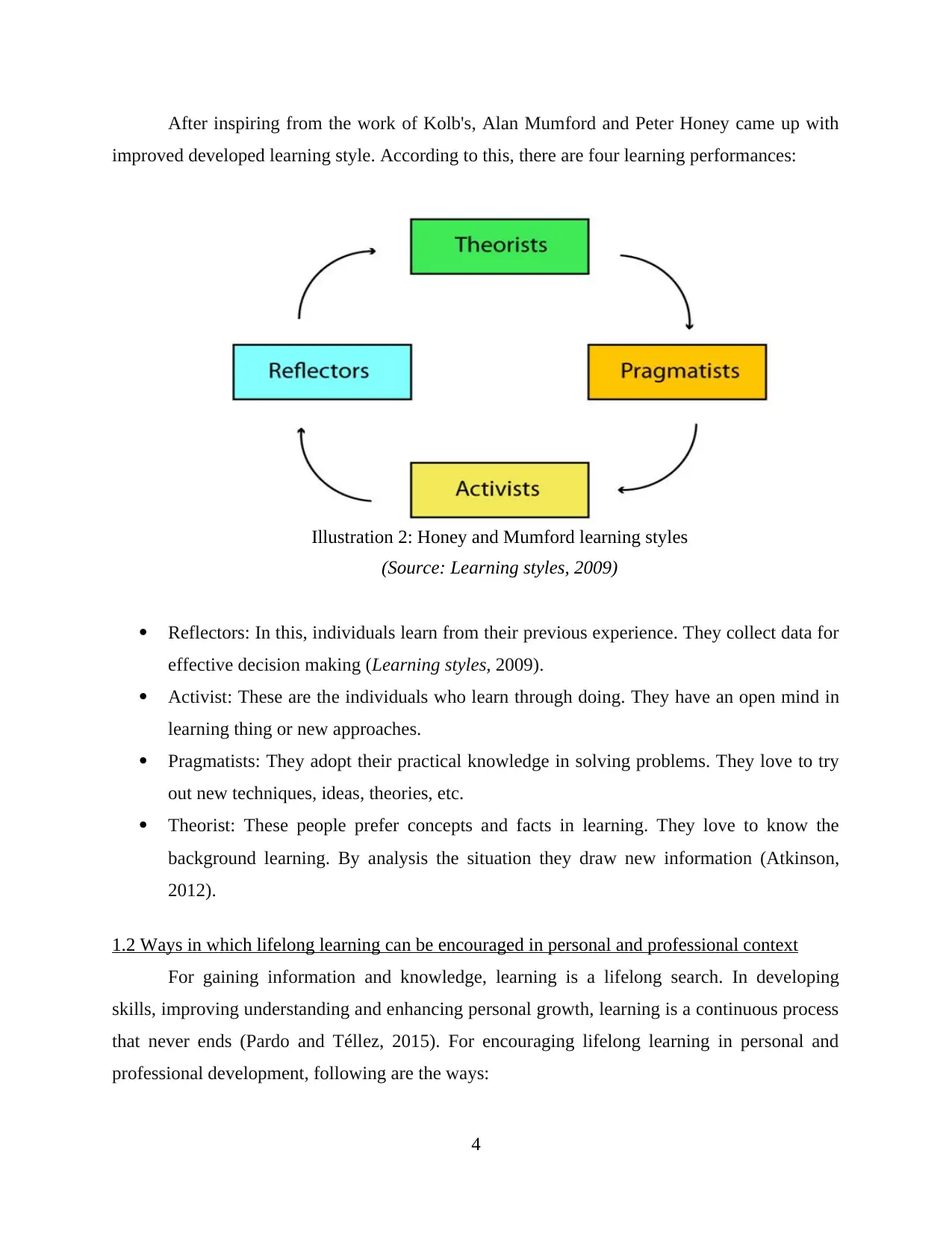
After inspiring from the work of Kolb's, Alan Mumford and Peter Honey came up with
improved developed learning style. According to this, there are four learning performances:
Reflectors: In this, individuals learn from their previous experience. They collect data for
effective decision making (Learning styles, 2009).
Activist: These are the individuals who learn through doing. They have an open mind in
learning thing or new approaches.
Pragmatists: They adopt their practical knowledge in solving problems. They love to try
out new techniques, ideas, theories, etc.
Theorist: These people prefer concepts and facts in learning. They love to know the
background learning. By analysis the situation they draw new information (Atkinson,
2012).
1.2 Ways in which lifelong learning can be encouraged in personal and professional context
For gaining information and knowledge, learning is a lifelong search. In developing
skills, improving understanding and enhancing personal growth, learning is a continuous process
that never ends (Pardo and Téllez, 2015). For encouraging lifelong learning in personal and
professional development, following are the ways:
4
Illustration 2: Honey and Mumford learning styles
(Source: Learning styles, 2009)
improved developed learning style. According to this, there are four learning performances:
Reflectors: In this, individuals learn from their previous experience. They collect data for
effective decision making (Learning styles, 2009).
Activist: These are the individuals who learn through doing. They have an open mind in
learning thing or new approaches.
Pragmatists: They adopt their practical knowledge in solving problems. They love to try
out new techniques, ideas, theories, etc.
Theorist: These people prefer concepts and facts in learning. They love to know the
background learning. By analysis the situation they draw new information (Atkinson,
2012).
1.2 Ways in which lifelong learning can be encouraged in personal and professional context
For gaining information and knowledge, learning is a lifelong search. In developing
skills, improving understanding and enhancing personal growth, learning is a continuous process
that never ends (Pardo and Téllez, 2015). For encouraging lifelong learning in personal and
professional development, following are the ways:
4
Illustration 2: Honey and Mumford learning styles
(Source: Learning styles, 2009)
⊘ This is a preview!⊘
Do you want full access?
Subscribe today to unlock all pages.

Trusted by 1+ million students worldwide
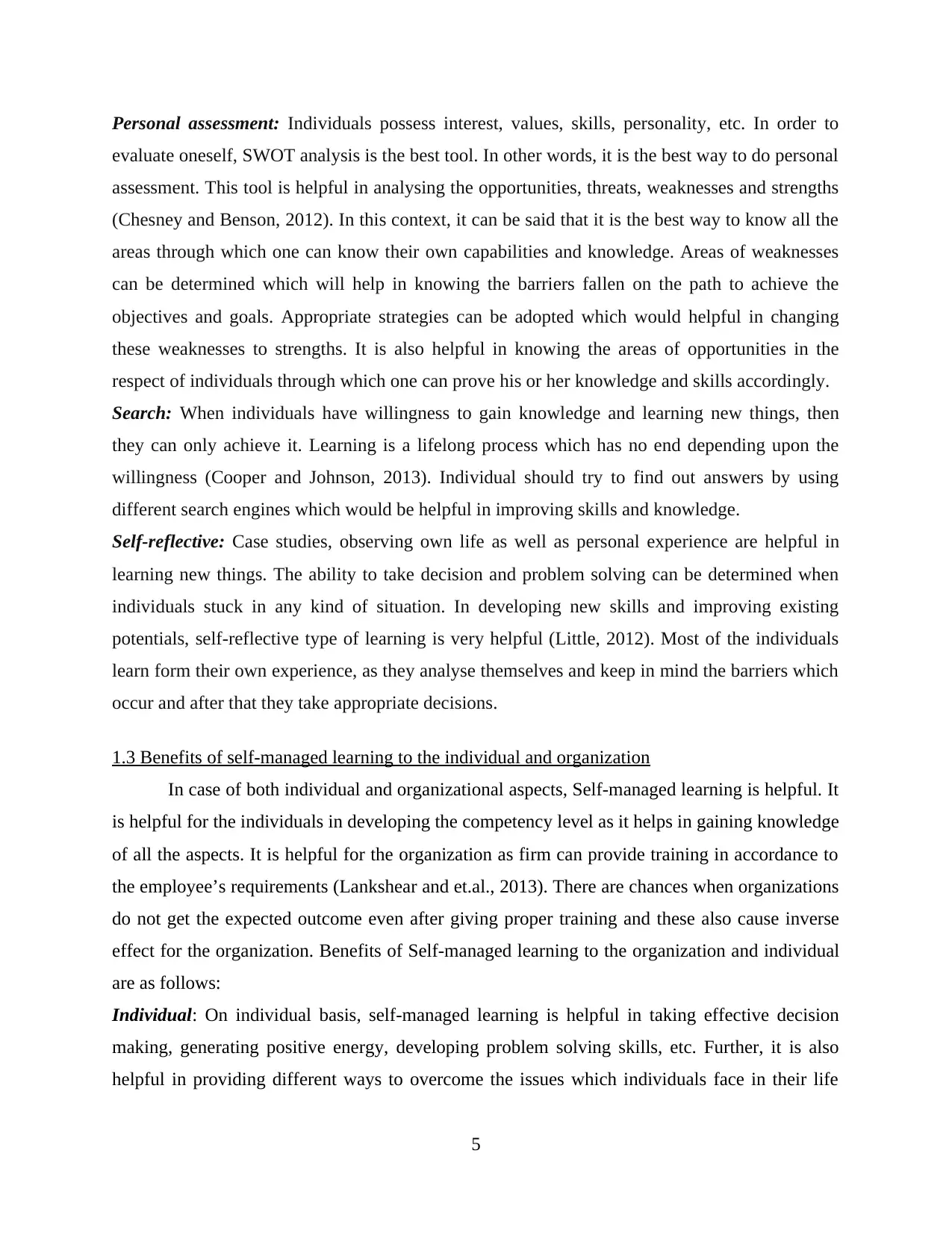
Personal assessment: Individuals possess interest, values, skills, personality, etc. In order to
evaluate oneself, SWOT analysis is the best tool. In other words, it is the best way to do personal
assessment. This tool is helpful in analysing the opportunities, threats, weaknesses and strengths
(Chesney and Benson, 2012). In this context, it can be said that it is the best way to know all the
areas through which one can know their own capabilities and knowledge. Areas of weaknesses
can be determined which will help in knowing the barriers fallen on the path to achieve the
objectives and goals. Appropriate strategies can be adopted which would helpful in changing
these weaknesses to strengths. It is also helpful in knowing the areas of opportunities in the
respect of individuals through which one can prove his or her knowledge and skills accordingly.
Search: When individuals have willingness to gain knowledge and learning new things, then
they can only achieve it. Learning is a lifelong process which has no end depending upon the
willingness (Cooper and Johnson, 2013). Individual should try to find out answers by using
different search engines which would be helpful in improving skills and knowledge.
Self-reflective: Case studies, observing own life as well as personal experience are helpful in
learning new things. The ability to take decision and problem solving can be determined when
individuals stuck in any kind of situation. In developing new skills and improving existing
potentials, self-reflective type of learning is very helpful (Little, 2012). Most of the individuals
learn form their own experience, as they analyse themselves and keep in mind the barriers which
occur and after that they take appropriate decisions.
1.3 Benefits of self-managed learning to the individual and organization
In case of both individual and organizational aspects, Self-managed learning is helpful. It
is helpful for the individuals in developing the competency level as it helps in gaining knowledge
of all the aspects. It is helpful for the organization as firm can provide training in accordance to
the employee’s requirements (Lankshear and et.al., 2013). There are chances when organizations
do not get the expected outcome even after giving proper training and these also cause inverse
effect for the organization. Benefits of Self-managed learning to the organization and individual
are as follows:
Individual: On individual basis, self-managed learning is helpful in taking effective decision
making, generating positive energy, developing problem solving skills, etc. Further, it is also
helpful in providing different ways to overcome the issues which individuals face in their life
5
evaluate oneself, SWOT analysis is the best tool. In other words, it is the best way to do personal
assessment. This tool is helpful in analysing the opportunities, threats, weaknesses and strengths
(Chesney and Benson, 2012). In this context, it can be said that it is the best way to know all the
areas through which one can know their own capabilities and knowledge. Areas of weaknesses
can be determined which will help in knowing the barriers fallen on the path to achieve the
objectives and goals. Appropriate strategies can be adopted which would helpful in changing
these weaknesses to strengths. It is also helpful in knowing the areas of opportunities in the
respect of individuals through which one can prove his or her knowledge and skills accordingly.
Search: When individuals have willingness to gain knowledge and learning new things, then
they can only achieve it. Learning is a lifelong process which has no end depending upon the
willingness (Cooper and Johnson, 2013). Individual should try to find out answers by using
different search engines which would be helpful in improving skills and knowledge.
Self-reflective: Case studies, observing own life as well as personal experience are helpful in
learning new things. The ability to take decision and problem solving can be determined when
individuals stuck in any kind of situation. In developing new skills and improving existing
potentials, self-reflective type of learning is very helpful (Little, 2012). Most of the individuals
learn form their own experience, as they analyse themselves and keep in mind the barriers which
occur and after that they take appropriate decisions.
1.3 Benefits of self-managed learning to the individual and organization
In case of both individual and organizational aspects, Self-managed learning is helpful. It
is helpful for the individuals in developing the competency level as it helps in gaining knowledge
of all the aspects. It is helpful for the organization as firm can provide training in accordance to
the employee’s requirements (Lankshear and et.al., 2013). There are chances when organizations
do not get the expected outcome even after giving proper training and these also cause inverse
effect for the organization. Benefits of Self-managed learning to the organization and individual
are as follows:
Individual: On individual basis, self-managed learning is helpful in taking effective decision
making, generating positive energy, developing problem solving skills, etc. Further, it is also
helpful in providing different ways to overcome the issues which individuals face in their life
5
Paraphrase This Document
Need a fresh take? Get an instant paraphrase of this document with our AI Paraphraser
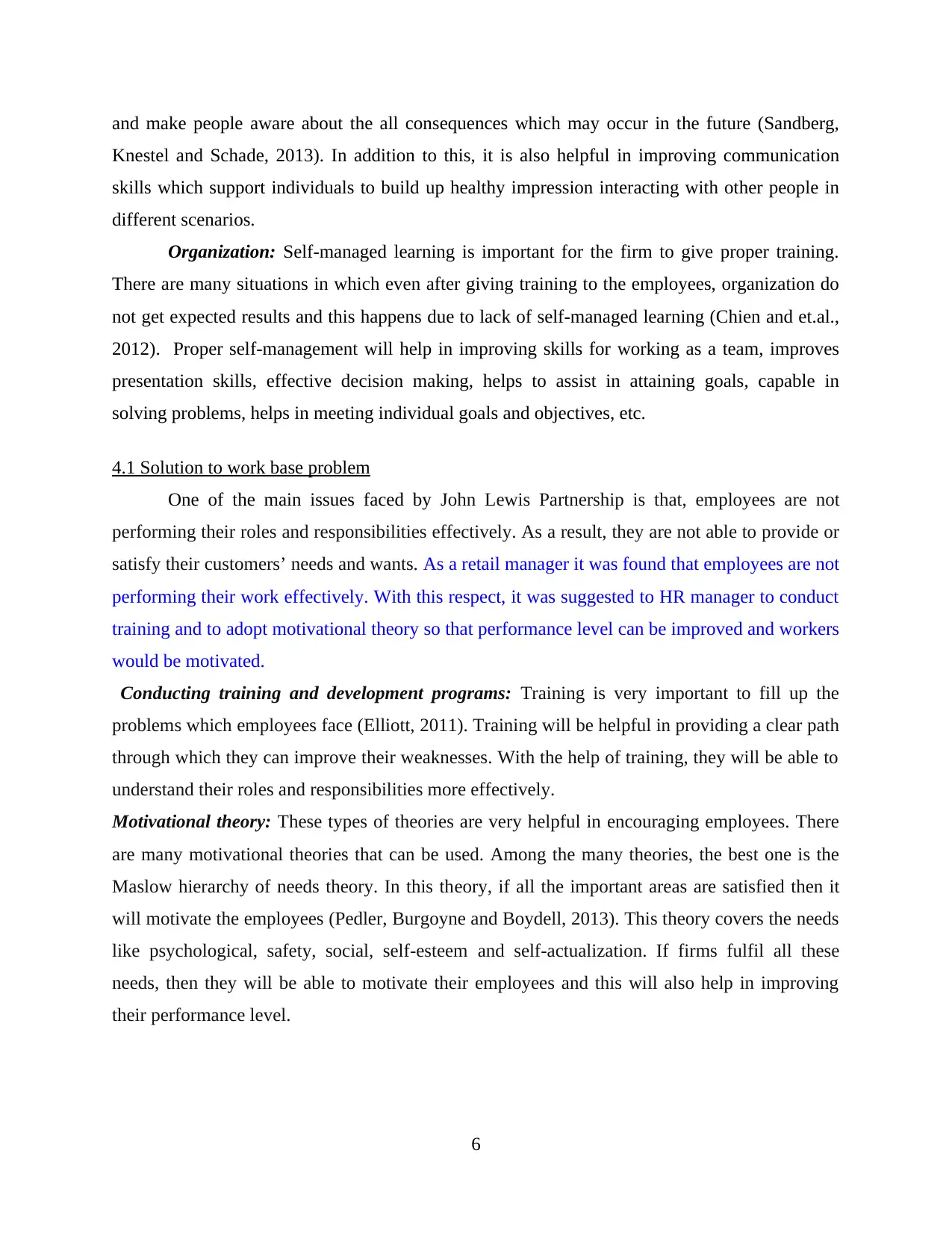
and make people aware about the all consequences which may occur in the future (Sandberg,
Knestel and Schade, 2013). In addition to this, it is also helpful in improving communication
skills which support individuals to build up healthy impression interacting with other people in
different scenarios.
Organization: Self-managed learning is important for the firm to give proper training.
There are many situations in which even after giving training to the employees, organization do
not get expected results and this happens due to lack of self-managed learning (Chien and et.al.,
2012). Proper self-management will help in improving skills for working as a team, improves
presentation skills, effective decision making, helps to assist in attaining goals, capable in
solving problems, helps in meeting individual goals and objectives, etc.
4.1 Solution to work base problem
One of the main issues faced by John Lewis Partnership is that, employees are not
performing their roles and responsibilities effectively. As a result, they are not able to provide or
satisfy their customers’ needs and wants. As a retail manager it was found that employees are not
performing their work effectively. With this respect, it was suggested to HR manager to conduct
training and to adopt motivational theory so that performance level can be improved and workers
would be motivated.
Conducting training and development programs: Training is very important to fill up the
problems which employees face (Elliott, 2011). Training will be helpful in providing a clear path
through which they can improve their weaknesses. With the help of training, they will be able to
understand their roles and responsibilities more effectively.
Motivational theory: These types of theories are very helpful in encouraging employees. There
are many motivational theories that can be used. Among the many theories, the best one is the
Maslow hierarchy of needs theory. In this theory, if all the important areas are satisfied then it
will motivate the employees (Pedler, Burgoyne and Boydell, 2013). This theory covers the needs
like psychological, safety, social, self-esteem and self-actualization. If firms fulfil all these
needs, then they will be able to motivate their employees and this will also help in improving
their performance level.
6
Knestel and Schade, 2013). In addition to this, it is also helpful in improving communication
skills which support individuals to build up healthy impression interacting with other people in
different scenarios.
Organization: Self-managed learning is important for the firm to give proper training.
There are many situations in which even after giving training to the employees, organization do
not get expected results and this happens due to lack of self-managed learning (Chien and et.al.,
2012). Proper self-management will help in improving skills for working as a team, improves
presentation skills, effective decision making, helps to assist in attaining goals, capable in
solving problems, helps in meeting individual goals and objectives, etc.
4.1 Solution to work base problem
One of the main issues faced by John Lewis Partnership is that, employees are not
performing their roles and responsibilities effectively. As a result, they are not able to provide or
satisfy their customers’ needs and wants. As a retail manager it was found that employees are not
performing their work effectively. With this respect, it was suggested to HR manager to conduct
training and to adopt motivational theory so that performance level can be improved and workers
would be motivated.
Conducting training and development programs: Training is very important to fill up the
problems which employees face (Elliott, 2011). Training will be helpful in providing a clear path
through which they can improve their weaknesses. With the help of training, they will be able to
understand their roles and responsibilities more effectively.
Motivational theory: These types of theories are very helpful in encouraging employees. There
are many motivational theories that can be used. Among the many theories, the best one is the
Maslow hierarchy of needs theory. In this theory, if all the important areas are satisfied then it
will motivate the employees (Pedler, Burgoyne and Boydell, 2013). This theory covers the needs
like psychological, safety, social, self-esteem and self-actualization. If firms fulfil all these
needs, then they will be able to motivate their employees and this will also help in improving
their performance level.
6
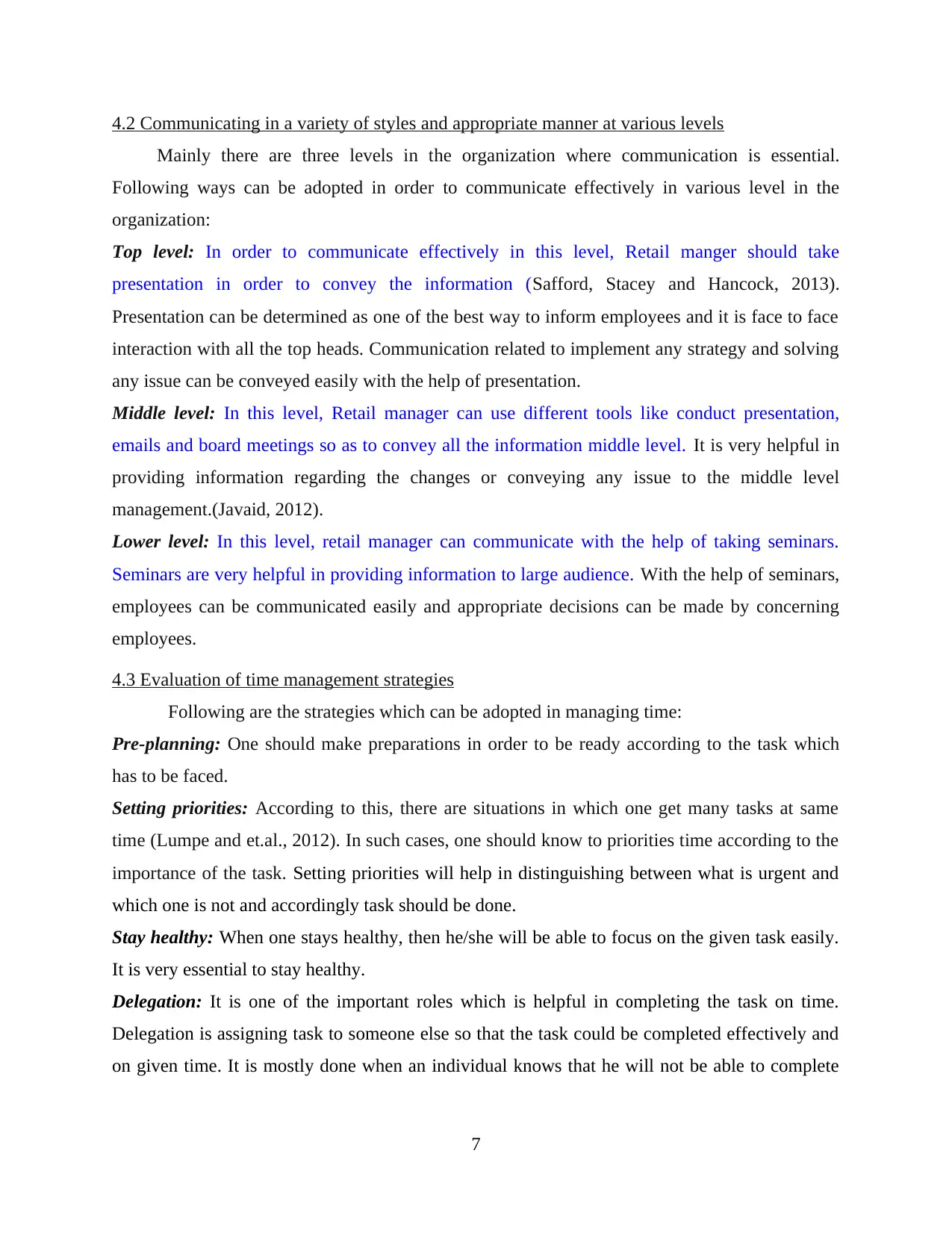
4.2 Communicating in a variety of styles and appropriate manner at various levels
Mainly there are three levels in the organization where communication is essential.
Following ways can be adopted in order to communicate effectively in various level in the
organization:
Top level: In order to communicate effectively in this level, Retail manger should take
presentation in order to convey the information (Safford, Stacey and Hancock, 2013).
Presentation can be determined as one of the best way to inform employees and it is face to face
interaction with all the top heads. Communication related to implement any strategy and solving
any issue can be conveyed easily with the help of presentation.
Middle level: In this level, Retail manager can use different tools like conduct presentation,
emails and board meetings so as to convey all the information middle level. It is very helpful in
providing information regarding the changes or conveying any issue to the middle level
management.(Javaid, 2012).
Lower level: In this level, retail manager can communicate with the help of taking seminars.
Seminars are very helpful in providing information to large audience. With the help of seminars,
employees can be communicated easily and appropriate decisions can be made by concerning
employees.
4.3 Evaluation of time management strategies
Following are the strategies which can be adopted in managing time:
Pre-planning: One should make preparations in order to be ready according to the task which
has to be faced.
Setting priorities: According to this, there are situations in which one get many tasks at same
time (Lumpe and et.al., 2012). In such cases, one should know to priorities time according to the
importance of the task. Setting priorities will help in distinguishing between what is urgent and
which one is not and accordingly task should be done.
Stay healthy: When one stays healthy, then he/she will be able to focus on the given task easily.
It is very essential to stay healthy.
Delegation: It is one of the important roles which is helpful in completing the task on time.
Delegation is assigning task to someone else so that the task could be completed effectively and
on given time. It is mostly done when an individual knows that he will not be able to complete
7
Mainly there are three levels in the organization where communication is essential.
Following ways can be adopted in order to communicate effectively in various level in the
organization:
Top level: In order to communicate effectively in this level, Retail manger should take
presentation in order to convey the information (Safford, Stacey and Hancock, 2013).
Presentation can be determined as one of the best way to inform employees and it is face to face
interaction with all the top heads. Communication related to implement any strategy and solving
any issue can be conveyed easily with the help of presentation.
Middle level: In this level, Retail manager can use different tools like conduct presentation,
emails and board meetings so as to convey all the information middle level. It is very helpful in
providing information regarding the changes or conveying any issue to the middle level
management.(Javaid, 2012).
Lower level: In this level, retail manager can communicate with the help of taking seminars.
Seminars are very helpful in providing information to large audience. With the help of seminars,
employees can be communicated easily and appropriate decisions can be made by concerning
employees.
4.3 Evaluation of time management strategies
Following are the strategies which can be adopted in managing time:
Pre-planning: One should make preparations in order to be ready according to the task which
has to be faced.
Setting priorities: According to this, there are situations in which one get many tasks at same
time (Lumpe and et.al., 2012). In such cases, one should know to priorities time according to the
importance of the task. Setting priorities will help in distinguishing between what is urgent and
which one is not and accordingly task should be done.
Stay healthy: When one stays healthy, then he/she will be able to focus on the given task easily.
It is very essential to stay healthy.
Delegation: It is one of the important roles which is helpful in completing the task on time.
Delegation is assigning task to someone else so that the task could be completed effectively and
on given time. It is mostly done when an individual knows that he will not be able to complete
7
⊘ This is a preview!⊘
Do you want full access?
Subscribe today to unlock all pages.

Trusted by 1+ million students worldwide
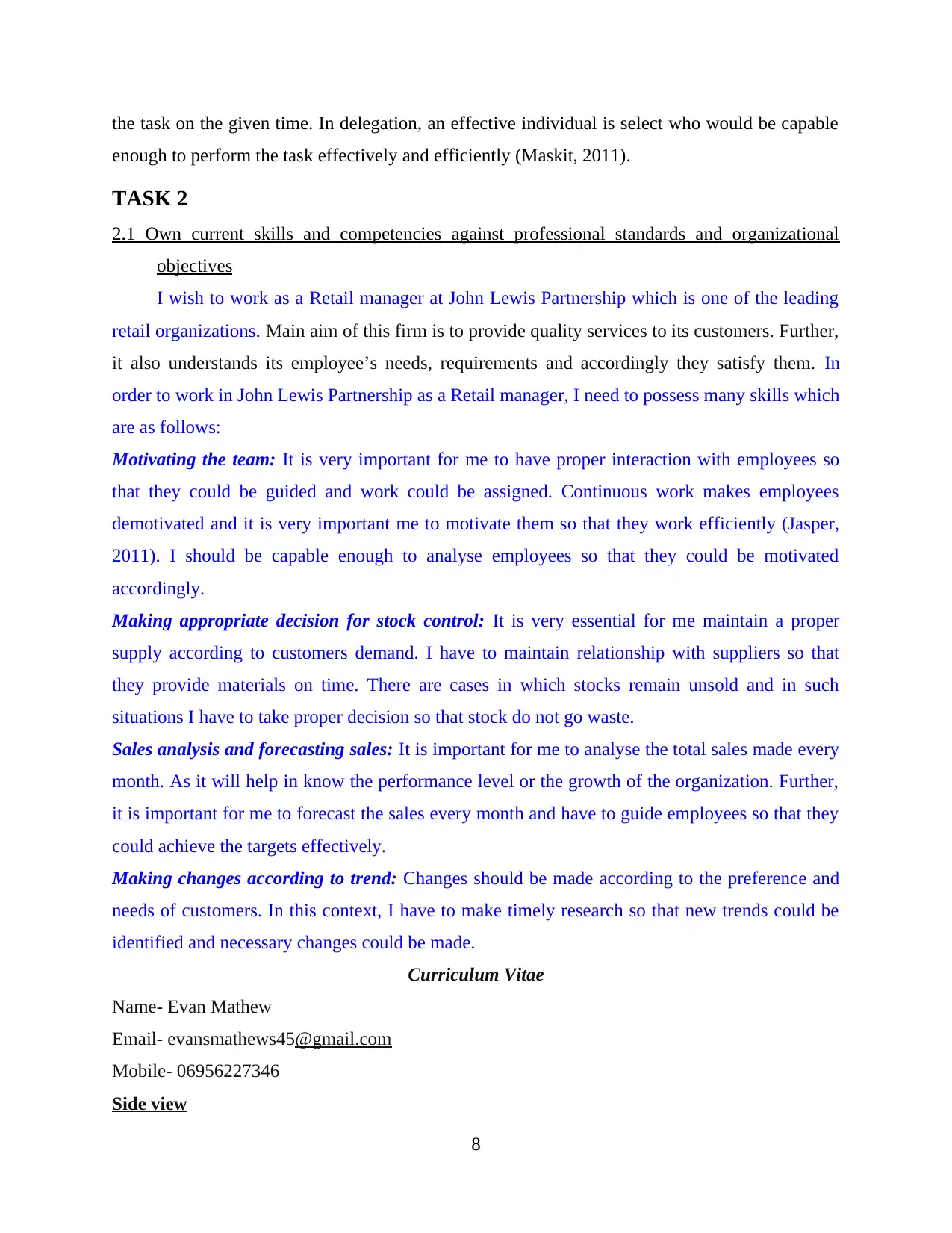
the task on the given time. In delegation, an effective individual is select who would be capable
enough to perform the task effectively and efficiently (Maskit, 2011).
TASK 2
2.1 Own current skills and competencies against professional standards and organizational
objectives
I wish to work as a Retail manager at John Lewis Partnership which is one of the leading
retail organizations. Main aim of this firm is to provide quality services to its customers. Further,
it also understands its employee’s needs, requirements and accordingly they satisfy them. In
order to work in John Lewis Partnership as a Retail manager, I need to possess many skills which
are as follows:
Motivating the team: It is very important for me to have proper interaction with employees so
that they could be guided and work could be assigned. Continuous work makes employees
demotivated and it is very important me to motivate them so that they work efficiently (Jasper,
2011). I should be capable enough to analyse employees so that they could be motivated
accordingly.
Making appropriate decision for stock control: It is very essential for me maintain a proper
supply according to customers demand. I have to maintain relationship with suppliers so that
they provide materials on time. There are cases in which stocks remain unsold and in such
situations I have to take proper decision so that stock do not go waste.
Sales analysis and forecasting sales: It is important for me to analyse the total sales made every
month. As it will help in know the performance level or the growth of the organization. Further,
it is important for me to forecast the sales every month and have to guide employees so that they
could achieve the targets effectively.
Making changes according to trend: Changes should be made according to the preference and
needs of customers. In this context, I have to make timely research so that new trends could be
identified and necessary changes could be made.
Curriculum Vitae
Name- Evan Mathew
Email- evansmathews45@gmail.com
Mobile- 06956227346
Side view
8
enough to perform the task effectively and efficiently (Maskit, 2011).
TASK 2
2.1 Own current skills and competencies against professional standards and organizational
objectives
I wish to work as a Retail manager at John Lewis Partnership which is one of the leading
retail organizations. Main aim of this firm is to provide quality services to its customers. Further,
it also understands its employee’s needs, requirements and accordingly they satisfy them. In
order to work in John Lewis Partnership as a Retail manager, I need to possess many skills which
are as follows:
Motivating the team: It is very important for me to have proper interaction with employees so
that they could be guided and work could be assigned. Continuous work makes employees
demotivated and it is very important me to motivate them so that they work efficiently (Jasper,
2011). I should be capable enough to analyse employees so that they could be motivated
accordingly.
Making appropriate decision for stock control: It is very essential for me maintain a proper
supply according to customers demand. I have to maintain relationship with suppliers so that
they provide materials on time. There are cases in which stocks remain unsold and in such
situations I have to take proper decision so that stock do not go waste.
Sales analysis and forecasting sales: It is important for me to analyse the total sales made every
month. As it will help in know the performance level or the growth of the organization. Further,
it is important for me to forecast the sales every month and have to guide employees so that they
could achieve the targets effectively.
Making changes according to trend: Changes should be made according to the preference and
needs of customers. In this context, I have to make timely research so that new trends could be
identified and necessary changes could be made.
Curriculum Vitae
Name- Evan Mathew
Email- evansmathews45@gmail.com
Mobile- 06956227346
Side view
8
Paraphrase This Document
Need a fresh take? Get an instant paraphrase of this document with our AI Paraphraser
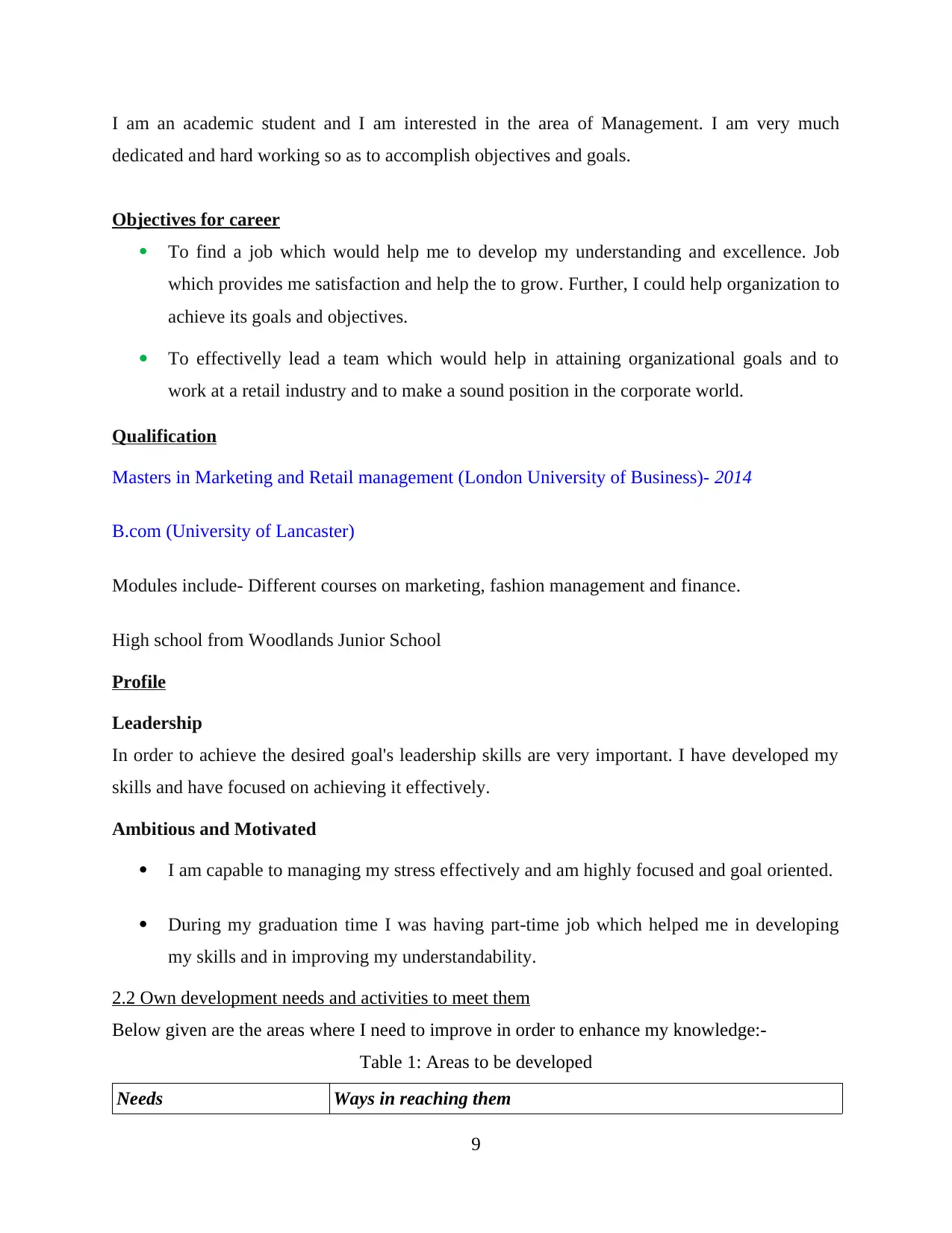
I am an academic student and I am interested in the area of Management. I am very much
dedicated and hard working so as to accomplish objectives and goals.
Objectives for career
To find a job which would help me to develop my understanding and excellence. Job
which provides me satisfaction and help the to grow. Further, I could help organization to
achieve its goals and objectives.
To effectivelly lead a team which would help in attaining organizational goals and to
work at a retail industry and to make a sound position in the corporate world.
Qualification
Masters in Marketing and Retail management (London University of Business)- 2014
B.com (University of Lancaster)
Modules include- Different courses on marketing, fashion management and finance.
High school from Woodlands Junior School
Profile
Leadership
In order to achieve the desired goal's leadership skills are very important. I have developed my
skills and have focused on achieving it effectively.
Ambitious and Motivated
I am capable to managing my stress effectively and am highly focused and goal oriented.
During my graduation time I was having part-time job which helped me in developing
my skills and in improving my understandability.
2.2 Own development needs and activities to meet them
Below given are the areas where I need to improve in order to enhance my knowledge:-
Table 1: Areas to be developed
Needs Ways in reaching them
9
dedicated and hard working so as to accomplish objectives and goals.
Objectives for career
To find a job which would help me to develop my understanding and excellence. Job
which provides me satisfaction and help the to grow. Further, I could help organization to
achieve its goals and objectives.
To effectivelly lead a team which would help in attaining organizational goals and to
work at a retail industry and to make a sound position in the corporate world.
Qualification
Masters in Marketing and Retail management (London University of Business)- 2014
B.com (University of Lancaster)
Modules include- Different courses on marketing, fashion management and finance.
High school from Woodlands Junior School
Profile
Leadership
In order to achieve the desired goal's leadership skills are very important. I have developed my
skills and have focused on achieving it effectively.
Ambitious and Motivated
I am capable to managing my stress effectively and am highly focused and goal oriented.
During my graduation time I was having part-time job which helped me in developing
my skills and in improving my understandability.
2.2 Own development needs and activities to meet them
Below given are the areas where I need to improve in order to enhance my knowledge:-
Table 1: Areas to be developed
Needs Ways in reaching them
9
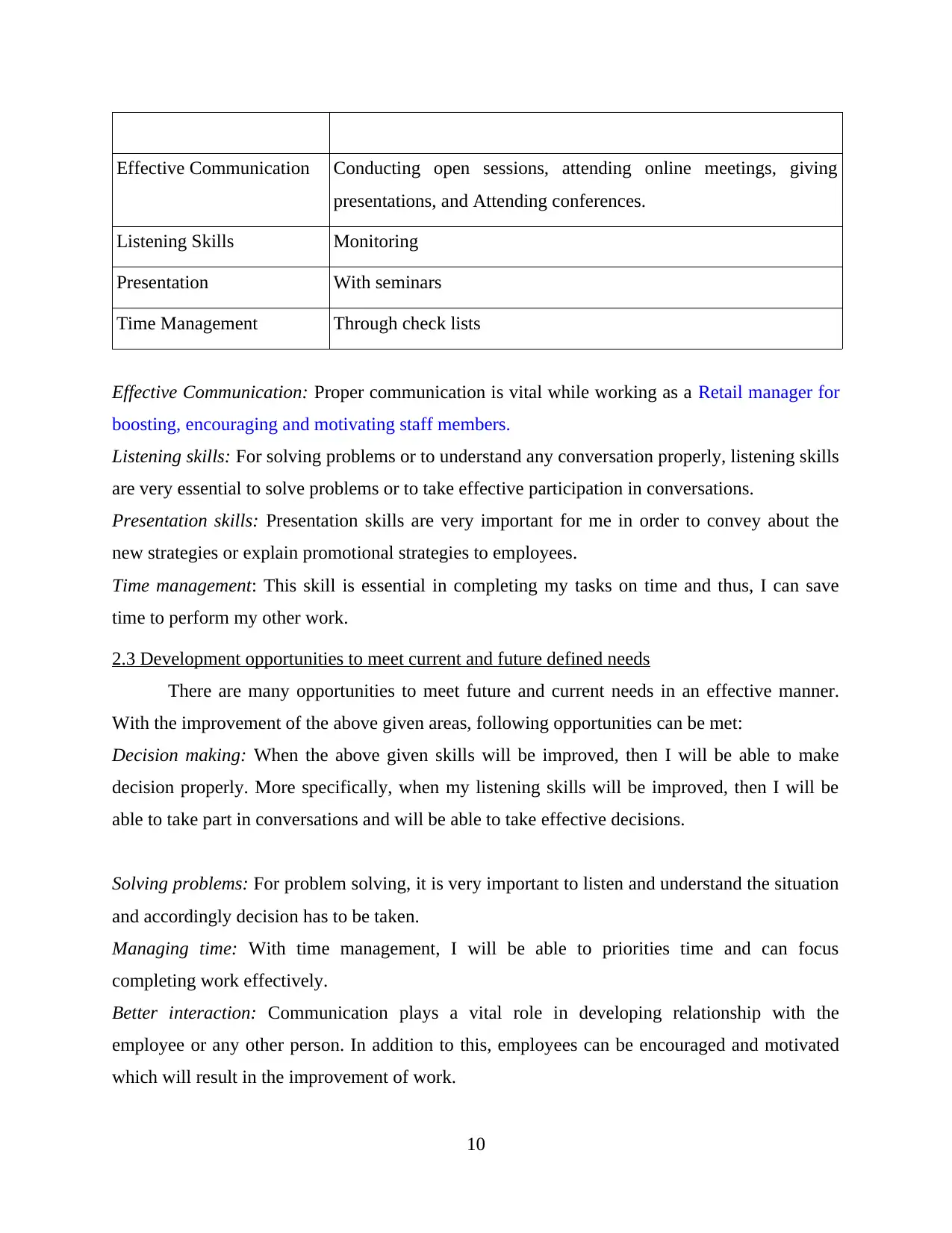
Effective Communication Conducting open sessions, attending online meetings, giving
presentations, and Attending conferences.
Listening Skills Monitoring
Presentation With seminars
Time Management Through check lists
Effective Communication: Proper communication is vital while working as a Retail manager for
boosting, encouraging and motivating staff members.
Listening skills: For solving problems or to understand any conversation properly, listening skills
are very essential to solve problems or to take effective participation in conversations.
Presentation skills: Presentation skills are very important for me in order to convey about the
new strategies or explain promotional strategies to employees.
Time management: This skill is essential in completing my tasks on time and thus, I can save
time to perform my other work.
2.3 Development opportunities to meet current and future defined needs
There are many opportunities to meet future and current needs in an effective manner.
With the improvement of the above given areas, following opportunities can be met:
Decision making: When the above given skills will be improved, then I will be able to make
decision properly. More specifically, when my listening skills will be improved, then I will be
able to take part in conversations and will be able to take effective decisions.
Solving problems: For problem solving, it is very important to listen and understand the situation
and accordingly decision has to be taken.
Managing time: With time management, I will be able to priorities time and can focus
completing work effectively.
Better interaction: Communication plays a vital role in developing relationship with the
employee or any other person. In addition to this, employees can be encouraged and motivated
which will result in the improvement of work.
10
presentations, and Attending conferences.
Listening Skills Monitoring
Presentation With seminars
Time Management Through check lists
Effective Communication: Proper communication is vital while working as a Retail manager for
boosting, encouraging and motivating staff members.
Listening skills: For solving problems or to understand any conversation properly, listening skills
are very essential to solve problems or to take effective participation in conversations.
Presentation skills: Presentation skills are very important for me in order to convey about the
new strategies or explain promotional strategies to employees.
Time management: This skill is essential in completing my tasks on time and thus, I can save
time to perform my other work.
2.3 Development opportunities to meet current and future defined needs
There are many opportunities to meet future and current needs in an effective manner.
With the improvement of the above given areas, following opportunities can be met:
Decision making: When the above given skills will be improved, then I will be able to make
decision properly. More specifically, when my listening skills will be improved, then I will be
able to take part in conversations and will be able to take effective decisions.
Solving problems: For problem solving, it is very important to listen and understand the situation
and accordingly decision has to be taken.
Managing time: With time management, I will be able to priorities time and can focus
completing work effectively.
Better interaction: Communication plays a vital role in developing relationship with the
employee or any other person. In addition to this, employees can be encouraged and motivated
which will result in the improvement of work.
10
⊘ This is a preview!⊘
Do you want full access?
Subscribe today to unlock all pages.

Trusted by 1+ million students worldwide
1 out of 20
Related Documents
Your All-in-One AI-Powered Toolkit for Academic Success.
+13062052269
info@desklib.com
Available 24*7 on WhatsApp / Email
![[object Object]](/_next/static/media/star-bottom.7253800d.svg)
Unlock your academic potential
Copyright © 2020–2026 A2Z Services. All Rights Reserved. Developed and managed by ZUCOL.




